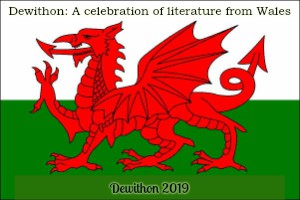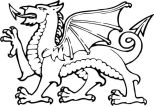It’s about time I rounded off my Dewithon experience, late as usual. Including the two books still unfinished, I notched up twelve books.
Usually I finish maybe five in a month so I’m rather proud of that though some were quite slim volumes, which helped, and four were children’s books which again, are quick reads. Nonetheless, I’m pleased with the range of reading as much as the number of titles. It was a thoroughly positive experience to immerse myself in a month of themed reading and I plan to do it again, although not just yet! And the experience was enhanced by Paula’s assiduous collating and commenting, plus the many and varied posts by others. Unfortunately only one of my dozen was a book I already owned, and none came from my TBR list. In fact, the TBR is now significantly bolstered by Welsh literature gleaned from recommendations and other contributors’ reviews. I hadn’t bargained for that!

Thinking about how to pull together my month of Welsh reading, I came across another article by Owen Sheers which is written from the perspective of a Welshman, yet underlines how I’ve felt as I’ve been reading. I’ve been surprised by how little I knew of Welsh literature but Sheers points out that for much of the last century relatively little anglo-welsh literature was available. He contrasts the relationship between English and Irish literature against that of English and Welsh, and certainly for myself I could rattle off numerous Irish writers but I’d struggle to match that with a string of Welsh. Sheers was writing towards the beginning of the Library of Wales initiative, which now includes more than fifty titles – each a twentieth-century classic which had previously fallen out of print. He explains that the intention at the time of his article (2006) was that every school and public library in Wales should have a full set of these books.
“… in an attempt to restock what the series editor Professor Dai Smith describes as, “a national memory bank that just wasn’t as available as you would expect it to be”.
I hope that aim has been achieved and I hope there are now plenty of these books to be found in English libraries too. Discovering the Library of Wales series, along with several small Welsh publishers that I’d heard of but never really looked at properly, have been added bonuses for me.
Rounding-off then, here’s a summary of what I read. I plan to review all of the books eventually and I’ll add the links as I go.
Children’s Literature
The Snow Spider
Emlyn’s Moon by Jenny Nimmo reviewed together
The Chestnut Soldier here
The Owl Service by Alan Garner review to follow
Poetry
The Glass Hollow by Owen Sheers reviewed here
Non-fiction
A Private Language by Marion Eames discussed here
The Autobiography of a SuperTramp
by W H Davies review to follow
At the Source: A Writer’s Year by Gillian Clarke review to follow
Contemporary Novels
Eve Green by Susan Fletcher review to follow
Cove by Cynan Jones review to follow
Short Stories
The Second Penguin Book of Welsh Short Stories edited by Alun Richards (still reading)
Classic Novel
The Valley, The City, The Village by Glyn Jones (still reading)
When all the reviews are finally finished, I’ll have added three more to my Classics Club list, (I’m counting The Snow Spider Trilogy as one) and discovered a book which resonates so strongly that it will become the first in my 100 Book Library – another initiative from Paula which I’ll write about soon. I’ve encountered five new authors, excluding those in the short story collection and most importantly, gained a stronger understanding of the Welsh experience: the history, the language, the culture.
Sheers begins his article thus:
“While any good writing will transcend national borders it is still in literature, and perhaps most of all in the novel, that national identity and character are often best reflected. Yet, looking back across the border from England in the mid-1990s, I couldn’t see the innate Welshness I felt within me represented anywhere in a body of fiction.”
Whilst acknowledging that I’ve barely scratched the surface, I feel able to say that my reading so far has given me a glimpse of that innate Welshness: of the people, the country, the culture and the history. I’m still hoping we will make a road trip through Wales this year. If we do, I will see Wales through new eyes.


How appropriate! This very day I got a message from the library that the Owen Sheers I ordered on your recommendation has come in for me. Best scuttle on down there… though reading is coming a poor second to busyness at the moment. I’ll have to try to put that right.
LikeLiked by 3 people
I hope the book lives up to expectations, Margaret!
LikeLike
Sandra, as usual ,thanks for opening yet another perspective on the written word.I have said this before- and speak only as a reader of the English language- but I am completely in awe of the infinite variety produced by 26 shapes and their associated combinations and sounds. True alchemy.
xx
LikeLiked by 4 people
Alchemy indeed, Pat. And infinitely wonderful! xx
LikeLike
I feel I need to brush up my knowledge of Welsh writing. I’ve only read Alan Garner’s books. It’ll be interesting to see how it compares with Scottish writers as I see quite a difference between Scottish and English authors, especially where description of landscape is concerned.
LikeLiked by 4 people
I avoided mention of Scotland and Scottish writers, Katrina, because the subject already felt huge enough. But it’s on my radar. I would love to hear more about the difference you have noticed.
LikeLike
This was a lovely surprise, Sandra. Thank you so much. I’m so pleased you had such a successful Dewithon. It’s a great pity something similar isn’t taking place with Cornish literature – although Ali Hope (Heavenali) is running a Daphne du Maurier reading week next month. Anyhow, I very much hope you’ll be able to take part again next year. 🤗
LikeLiked by 3 people
Thank YOU, Paula; it’s been great! 😀 I’m onto the du Maurier event, which has in a smaller way, initiated a mini readthon of its own for me – lovely! And I have thought about something Cornish-based but wouldn’t know where to start. There are various bloggers here with far greater knowledge than me who would be better suited to such an event. But maybe one day 🙂 (St Piran’s Day is 6th March – clashing with both Welsh and Irish readathons!)
LikeLiked by 2 people
I didn’t get the chance to even start this reading list however have come in to possession of the Owl Service and On the Black Hill which I think I mentioned to you.
Looking forward to eventually getting to them both, and look forward to reading more reviews from you.
LikeLiked by 3 people
I know that feeling – time has a habit of getting away from all of us I think 🙂 But books are patient – they will wait for the right moment.
LikeLiked by 1 person
You did excellently! It is odd that Irish literature has stormed ahead despite the cultural domination of England, while Welsh and Scots writers seem to do less well (except crime writers in Scotland who’ve carved out a solid space, but Scottish literary fiction authors are rare and exotic creatures who seem to fly south to London as soon as their wings will allow them, sadly). Presumably because Ireland has always had a stronger independence movement and, of course, actual independence for most of them for a century now…
LikeLiked by 3 people
I like to feel that I have at least a rudimentary knowledge of Scottish writers, although now you’ve pointed it out, probably all the contemporary Scottish authors I could name are crime writers. I think the situation for Welsh literature has been more complicated because of the dual languages. Are there any Scottish writers who write in Gaelic? Perhaps there are! I need to know more about Scottish literature. I would love someone to initiate a Read Scotland Month. Maybe ….. 🤔 😆
LikeLiked by 1 person
Wow! You seem to have had a great month soaking in Welsh literature, culture and history. I was also surprised by how little I knew about Welsh literature and had fun learning more through this event. I look forward to your reviews to come…and the list of suggestions for next year continues. 🙂
LikeLiked by 3 people
It was great fun, wasn’t it! I’ve still got plenty of reviews to catch up on from other people as well as getting my own out. Hopefully in time for the event next year! 😀
LikeLiked by 2 people
I very much like the idea of travelling through Wales and seeing it with eyes refreshed by reading. The literature of the borders is also a rich area. Eg ‘Turf or Stone’ by Margiad Evans (and her other work).
LikeLiked by 2 people
Thank you, Maria, another author I think I will love 🙂 I agree about the border area: geographically I’ve always been drawn to it and what little I’ve read has resonated. So much to explore!
LikeLiked by 1 person
Maybe I’ll read my copy of The Owl Service
LikeLiked by 3 people
Derrick, of the various books I read I was most disappointed by The Owl Service. Expectations were set too high perhaps. Which is not to say that you shouldn’t dust it off and give it a try!
LikeLiked by 1 person
I haven’t been able to find it!!
LikeLiked by 1 person
Possibly fortuitous!
LikeLiked by 1 person
🙂
LikeLike
It’s funny but Wales seems to be less-known, less-acknowledged, in general, not just regarding literature. I wonder why that is? People here talk about going to Ireland and England, and make trips, but I never hear anyone say they’re going to Wales. Maybe Wales needs better PR? Or maybe they like things just the way they are.
LikeLiked by 2 people
That’s a very good point, Kerry, particularly because I imagine there are also plenty of people who talk about making trips to Scotland too. Perhaps in part it’s because of ancestral connections – plenty of migrants from England, Scotland and Ireland crossed the seas. The population of Wales is so much smaller to begin with, migrants will have been fewer. I think also that Wales suffers from being annexed to England; it loses visibility. But I’ve barely scratched the surface; I have merely established just how little I know and how much more I would like to know.
LikeLiked by 1 person
Well done Sandra, it sounds like a very worthwhile and enjoyable experience.
LikeLiked by 2 people
An experience I’m looking forward to repeating, Andrea 🙂
LikeLiked by 1 person
I enjoyed your posts about your Welsh reading – you are helping to inspire to read more fiction again – as lately I have been sadly stuck in reading online, which is a sorry state of affairs! Especially as I used to be such an avid reader of fiction in particular. Somehow, as I get older I get more disappointed. I was never that keen on page turners. The last novel I read that held me was going back to read Thomas Hardy! Suitably sombre perhaps.
LikeLiked by 3 people
I do know what you mean, Carol; I get stuck sometimes and nothing seems appropriate. I hope you soon find some books that enthuse you, meanwhile you have so much else around you to stimulate, inspire and delight 🙂
LikeLiked by 1 person